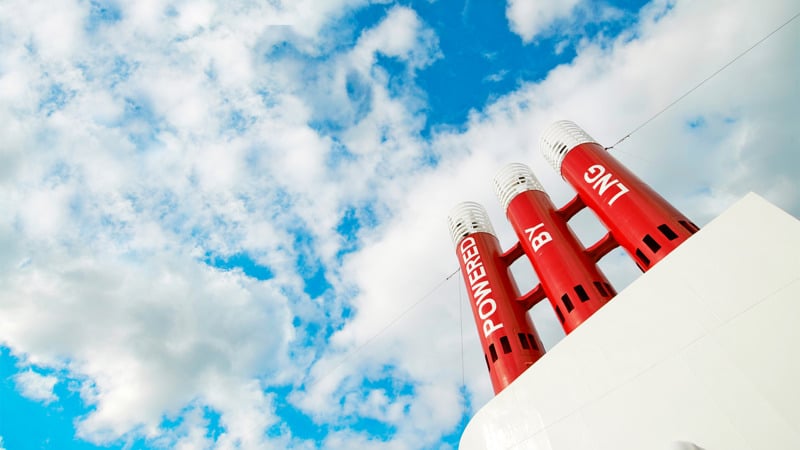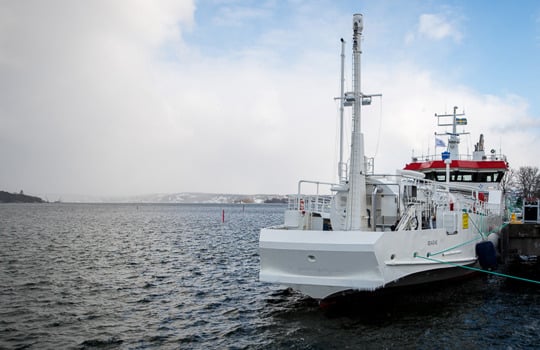Shipping companies must be prepared for the tightening EU regulations
Shipping companies must prepare for stricter EU regulations as the European Union tightens emissions rules for the maritime sector. New regulations and customer demands will drive the need for low-emission maritime fuels like renewable biogas and synthetic methane. Gasum stands ready to assist its customers in compliance and emissions reduction.
The European maritime industry faces significant changes impacting all companies operating in European waters. Under the EU's Fit for 55 regulatory package, companies must reduce the greenhouse gas intensity of the energy used by vessels. In practice, this means companies need to buy low or zero emission fuels.
The forthcoming FuelEU Maritime regulation will mandate a 2% reduction from 2020 levels in fleet greenhouse gas emissions by 2030, escalating to 80% by 2050. Additionally, the EU Emission Trading System (ETS) will affect the maritime industry for the first time in 2024. Companies using fossil fuels will need to purchase and use EU ETS emission allowances for each tonne of reported CO2 emissions.
"The scale of change will be significant, with five directives tightening maritime emissions rules. Companies must assess their vessel operations and transition to low-emission fuels promptly. At Gasum, our mission is to ensure our customers' long-term compliance with available low-emission fuel options, such as LNG, fully renewable biogas, or synthetic methane," says Jani Arala, Gasum's Head of Sustainable Logistics Solutions.
The demand for low-emission biofuels is set to increase
The demand for low-emission biofuels is set to rise due to these regulations, and Gasum is committed to meeting its customers' needs. Gasum plans to introduce an additional 7 TWh of biogas by 2027, reducing emissions and addressing the growing demand for biofuels in the maritime sector.
Gasum is also actively participating in the emerging synthetic fuel market, aiming to provide more emission-free synthetic methane. Another potential synthetic fuel is green and e-methanol, but they face challenges in terms of vessel engines capable of utilizing methanol and the necessary bunkering infrastructure.
Electric engines are gaining traction for short-range travel, while long-haul electric shipping remains challenging due to, among other things, space requirements.
"In the long term, compliant cleaner maritime fuels like LNG, LBG, and synthetic methane are viable options due to availability and futureproofing. Dual-fuel engines allow ships to transition cost-effectively, and LNG dual fuel vessels can use all renewable and e-methane types as 'drop-in' fuels, with solid LNG vessel order books," Jani Arala adds.

Portfolio management services bring competitive advantage when dealing with ETS
In 2024, the maritime industry faces a significant shift with the Emission Trading System (ETS), which mandates companies to purchase emission allowances for fossil fuels used. Unlike some sectors, the maritime industry does not receive free allowances.
The EU ETS will gradually impact shipping companies. In the first year, they must offset 40% of maritime emissions, with this requirement reaching 100% after three years in 2027.
For shipping companies relying on fossil fuels, this will lead to significantly higher costs, inevitably affecting customer prices. One option for shipping companies who participate in ETS is to outsource allowance purchasing or otherwise seek help from portfolio management services.
Gasum offers comprehensive portfolio management services related to EU ETS with capabilities of taking care of the whole process on customers’ behalf.
"Timely allowance purchases within the EU ETS can be a complex and dynamic endeavor, necessitating specialized knowledge. We have observed, alongside our clients, that outsourcing emission trading is often a cost-effective and practical choice. Gasum's dedicated specialists monitor market conditions, ensuring our customers with predictability and transparency regarding allowance costs, risk reductions in price and volume risks, and ultimately lower costs and less stress," Jani Arala explains.
Read more: Gasum Portfolio Services is your expert in EU ETS

"At Gasum, our mission is to ensure our customers' long-term compliance with available low-emission fuel options, such as LNG, fully renewable biogas, or synthetic methane."
Jani Arala, Gasum's Head of Sustainable Logistics Solutions



